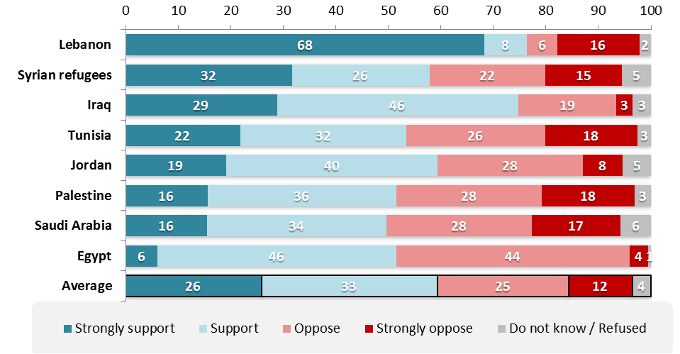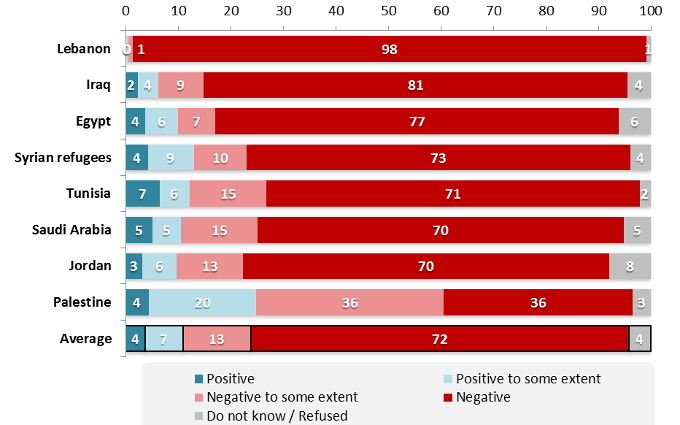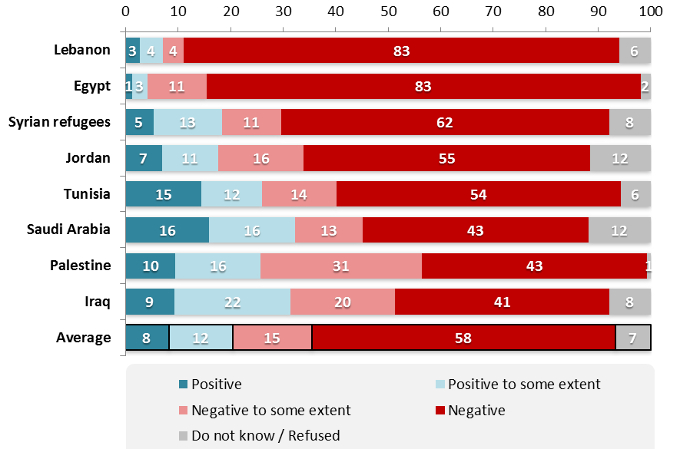To download/read a copy of the full report, please click here.
Findings from a survey by the Arab Opinion Index team, within the Doha-based Arab Center for Research and Policy Studies, and which were presented at near-simultaneous press conferences in Doha and Washington, DC, have demonstrated the depth of the Arab public’s distaste for the Islamic State in Iraq and the Levant (ISIL). Findings from telephone interviews with 5,100 respondents in seven Arab countries and in Syrian refugee camps located Lebanon, Jordan and Turkey show that 85% of the Arab holds negative views of ISIL, to varying degrees. This compares to only 11% of the Arab public whose views towards the group were either “Positive” or “Positive to some extent”.
When asked to explain the reasons for the backing which ISIL enjoyed amongst its supporters, only 13% of respondents cited the group’s adherence to Islamic principles. A much larger group (55%) explains support for ISIL by citing a host of other reasons: either due to its military achievements; its preparedness to challenge the West; its opposition to Iran and the Syrian and Iraqi regimes; or its purported support for the Sunni Muslim community in the Levant.
In line with respondents’ negative attitudes towards ISIL, 59% also voiced support for the military campaign led by the international coalition set up to oppose the group. Additionally, the public in the Arab region is supportive of Arab participation in the coalition. In contrast, roughly one-third of the Arab public forms an opposing camp who disagree either with the aims of the international coalition against ISIL and/or the participation of Arab countries within that coalition. Dr. Mohammad Almasri, the Coordinator of the Arab Public Opinion Project, elaborated on these results by contextualizing them in the timeframe during which the survey was carried out, pointing out that the turbulent turn of events in the Arab region meant that public attitudes towards these pressing developments would fluctuate.

Responses to the question "In general, do you support or oppose the military airstrikes by the US-led international coalition against Islamic militant groups including ISIL and other groups in Iraq and Syria?”
Even as a majority of the Arab public supports the aims of the coalition, they nevertheless remain skeptical of said coalition’s ability to achieve its aims. Only 22% express unqualified confidence in the ability of the US-led coalition to fulfill its mission. Furthermore, a majority of respondents indicated that a number of global and regional powers stood to gain the most from the actions of the international coalition formed to fight ISIL. Those powers were: the United States, Israel, Iran and the Syrian regime (in order of precedence). This contrasts with the meager 3% of the Arab public who believed that their own countries stood to gain from the coalition’s attacks on ISIL targets.
The results also indicate the opposition of a majority of the Arab public towards the United States, the country which is leading the coalition against ISIL: fully 73% of respondents describe US foreign policy in the region as either “Negative” or “Negative to some extent”. Similarly, a majority believes that the United States should end its military and financial support for Israel and help resolve the Syrian crisis if it is to improve its standing in the Arab world. Commenting on the results overall, Dr. Almasri described the Arab public as supportive of the coalition’s objectives; a position which he said was rooted in opposition to ISIL. Pointing to the Arab public’s skepticism of the coalition’s ability to achieve its aims, Almasri tied these to negative perceptions of US policies towards both the Palestinian cause and, latterly, the Syrian crisis. More poignant, he added, was the perception that the coalition’s campaign against ISIL would serve the interests of a number of global and regional powers, at the expense of respondents’ home countries.
Survey respondents took part through telephone interviews, and were selected at random from a database maintained by the ACRPS for its annual Arab Opinion Index, the largest survey of Arab public opinion in both scope and scale. The samples thus reflect the multi-stage cluster sampling method, with a margin of error for each of the samples/population groups cited at ±4%. In addition to 900 Syrian refugees drawn equally from three countries of residence (Jordan, Lebanon and Turkey), the sample comprised of 600 citizens from each of seven countries: Jordan, Lebanon, Iraq, Saudi Arabia, Egypt, Tunisia and Palestine.
The Arab Opinion Project—the Unit within the ACRPS responsible for public opinion surveys—is responsible for commissioning and overseeing an annual survey of Arab public opinion covering a variety of questions of public concern and a number of social and political matters. Its flagship project, the Arab Opinion Index, is the largest survey of its kind, and focuses on the Arab public’s attitudes towards questions of citizenship, democracy and political participation, as well as their views of their home countries’ state institutions and respondents’ financial and social circumstances.
This survey was carried out by the Arab Opinion Project (click for more information).

Respondents' answers to the question "In general, do you have a positive or negative view of ISIL?"

“All in all, how would you evaluate the foreign policy of the United States towards the Arab region? Is it Positive, Positive to some extent, Negative to some extent, or Negative?”